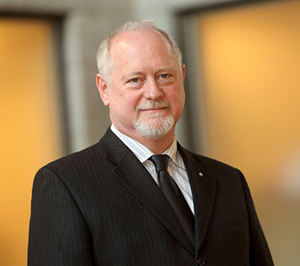At first glance, scientific research appears to be one of civilization’s most widely accessible and openly shared activities. All too frequently, however, patent laws and intellectual property agreements can restrict the sharing of discoveries, potentially delaying scientific progress.
As director of McGill’s University’s Montreal Neurological Institute, Guy Rouleau is especially sensitive to this dilemma. During his extensive career in neuroscience, he has seen few breakthroughs to match the life-saving and life-extending treatments that have emerged in other areas such as cancer, heart disease or stroke.
“We have had no treatments that affect the course of any single common neurodegenerative brain disease over the past 30 years,” he says. “The reason is that we don’t understand how the brain works. We have to do a much better job.”
That job, he adds, will require more talent and resources than any one institution can muster, which is why he wants to lay the task before the whole world with no restrictions. Late last year, the MNI launched the Tanenbaum Open Science Institute to provide full public access for everything from raw data to detailed analyses associated with the neurological institute’s ongoing research. Nor will the MNI pursue any form of intellectual property protection, a rare commitment amongst public- and private-sector research bodies for whom legal ownership of findings may be one of the few tangible assets they generate.
Dr. Rouleau insists that this move will instead generate universal benefit for everyone in the field, including those who want to study whether the application of patents in certain circumstances holds back the entire scientific enterprise.
“It’s a new way of doing research to spur innovations and accelerate knowledge, discovery and change,” he says. For example, once a group of researchers has studied a set of findings, he explains, other researchers may be able to do even more with the same information. “I might do 10 things with the data, but 100 other people will do 100 other things with the data.”

Dr. Rouleau emphasizes that this amplification of output can only occur when that data is freely and easily accessible – something that is neither free nor easy to accomplish. In fact, he estimates it could ultimately cost upward of $100 million for the MNI to achieve this goal, which will include everything from archiving of patients’ tissue samples to creating an on-line portal available to anyone in the world.
According to Richard Gold, a professor in McGill’s faculty of law, that steep price tag should not surprise advocates of what has been dubbed the open science initiative. These advocates regularly invoke the mantra that “knowledge wants to be free,” but such freedom comes with a daunting checklist that can only be completed by paying for a great deal of time, talent and physical resources.
“The data has to be collected, you have to make sense of it, curate it, you have to build the software, you have to have the hardware to deliver it, you have to make sure the format of the data is what people want, that it’s precise enough, that we’re transparent about how the data was collected,” says Dr. Gold.
The impact of open science on scientific progress has seldom been studied in detail, especially in the context of how this approach might promote the emergence of innovations with profound economic or social implications. Innovation is invariably hailed after the fact, so the underlying factors responsible may be all but impossible to identify. Dr. Gold therefore wants to take advantage of this unique opportunity to outfit the new institute’s administration with the tools to identify some of those factors in advance – including the absence of intellectual property – and link them to any resulting innovation. On this basis, he is seeking prospective sponsors in the philanthropic, governmental and industrial sectors with a vested interest in better understanding how innovation works.
“We all agree to travel the road together [even though] we’re not exactly sure where it leads,” he says. “By opening it up to partners, by allowing different people to access the data, we increase the opportunity for firms to find a way to move forward.” And even if MNI’s attempt to foster scientific progress is a failure, he adds, this examination of open science will nevertheless shed new light on the link between science and innovation.
For his part, Dr. Rouleau has seen little to suggest that the effect will be anything but positive for all concerned. During early consultations with the research community, he was greeted by a range of responses to this attempt to resolve what he calls the “perverse effect” of intellectual property.
“There was a lot of anxiety in some people; others were very comfortable,” he recalls. This eventually gave way to a shared desire to see science move as quickly as possible toward finding new therapies. “That as a principle was accepted by all.”
It was perhaps most notably accepted by the Larry and Judy Tanenbaum family, which provided a $20-million gift that set the new institute in motion. “Brain disease has impacted me personally,” says Larry Tanenbaum. “I lost my mother to Alzheimer’s, my father to a stroke, three dear friends to brain cancer and a brilliant friend and scientist to clinical depression. My hope is the Tanenbaum Open Science Institute will be a template to follow for other Canadian institutions studying brain function and disease, a new movement in Canadian research that will put progress ahead of all other considerations.”